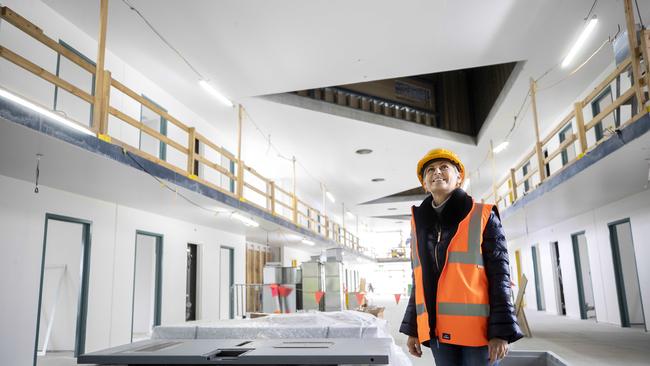Government announces push to recruit more Tassie prison officers
As the government struggles to staff the state’s prisons a new push is on to find more takers for the “challenging but rewarding” role. DETAILS >>
Tasmania
Don't miss out on the headlines from Tasmania. Followed categories will be added to My News.
- Fix Risdon Prison staffing crisis or resign, corrections Minister told
- Talking Point: My focus more than ever is on prisoner rehabilitation, says Elise Archer
A major push to find more staff for Tasmania’s troubled Prisons Service will begin on Saturday, Corrections Minister Elise Archer said. .
Chronic short staffing in the prison system has lead to lockdowns which have been described as breaches of international human rights conventions.
Ms Archer said the government was keen to attract more Tasmanians to come and work in prisons.
“We have invested significantly since coming to office, with more than 200 extra Correctional Officers in our prison system since 2016, including 79 in 2020 alone, but we know more needs to be done, and this is another positive step forward,” she said.
A recent report from the Office of the Custodial Inspector notes that despite the recruitment of 203 staff, 102 had left over the same period, 40 were off on workers compensation and an unknown number on long-term sick leave.
Another report found that nepotism, bias and bullying were ongoing problems and two of the recruit schools conducted in 2020 were not compliant with the required standards and subsequent training now has to be conducted as a result.

Ms Archer said the role of corrections officer was “challenging but rewarding”.
“Successful applicants will start training later this year before starting work in early 2022. “This follows an earlier selection process which will see 16 recruits commence their training in coming weeks and be available to start work later this year.”
Premier Peter Gutwein said he maintained confidence the senior management of the Tasmania Prisons Service — unlike 63 per cent of staff in a recent survey.
“I’d make this point in terms of the Attorney-General, she’s delivered more staff, she has delivered more investment into prisons,” he said.
“Importantly, she’s delivered an increased focus on rehabilitation as well.
“Plus, she’s been a reforming lawyer general and has provided significant reforms — in fact, I’ve got a list here, if you want me to read them out.”
Bullying, nepotism, bias plague prisons
NO progress was being made at fixing well-known and ongoing problems in Tasmania’s prison system, Custodial Inspector Richard Connock says.
Releasing the results of his latest survey of prison staff and inmates, Mr Connock said staff reported nepotism, bias and bullying were continuing and had low levels of confidence in management.
And prisoners had inadequate access to training, education and post-release support,” he said.
“Major issues raised in my inspection reports to date have not been addressed and whilst intentions may have been made to implement some recommendations, these attempts have either fallen short or not been administered adequately to achieve real change.”
“The results demonstrate prolonged and persistent inadequacies in the system that have not been addressed despite continued affirmation by the Department of Justice that recommendations are being acted on,” Mr Connock said.

“There would appear to be no real change or increase in rehabilitation or reintegration programs and services for prisoners to access, in fact we have identified a decrease in delivery and an increase in lockdowns.”
He said there had been little progress on the 38 recommendations he made in 2018 for reintegration and rehabilitation.
Mr Connock said reporting of bullying within the TPS remains an ongoing issue with fear of reprisal a major deterrent to reporting highlighted by prisoner survey responses.
And he said little has been done to address major staff concerns.
“The survey results indicate that, unfortunately, staff perceptions about nepotism, bias and bullying have not changed since the 2019 survey and that low levels of confidence in TPS management remain,” he said.
“There was a clear sense from staff of nepotism and bias in relation to opportunities for recruitment and advancement, in particular family members of existing staff being appointed to TPS positions, and many staff felt unsupported by management and Human Resources to raise issues formally due to fears of repercussion, reprisal and/or inaction.”
And he said two recruit schools conducted in 2020 had not met minimum standards.
Corrections Minister Elise Archer said the govenrment had noted the report.
“While work is already underway to address a number of issues identified by respondents, the TPS will consider the results of both surveys to identify if any further actions are required,” she said.



